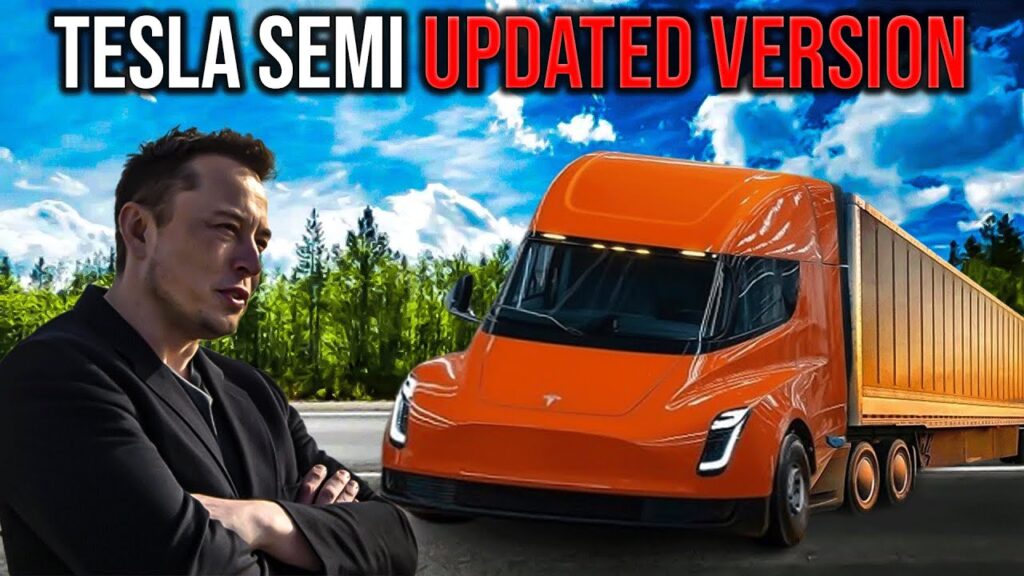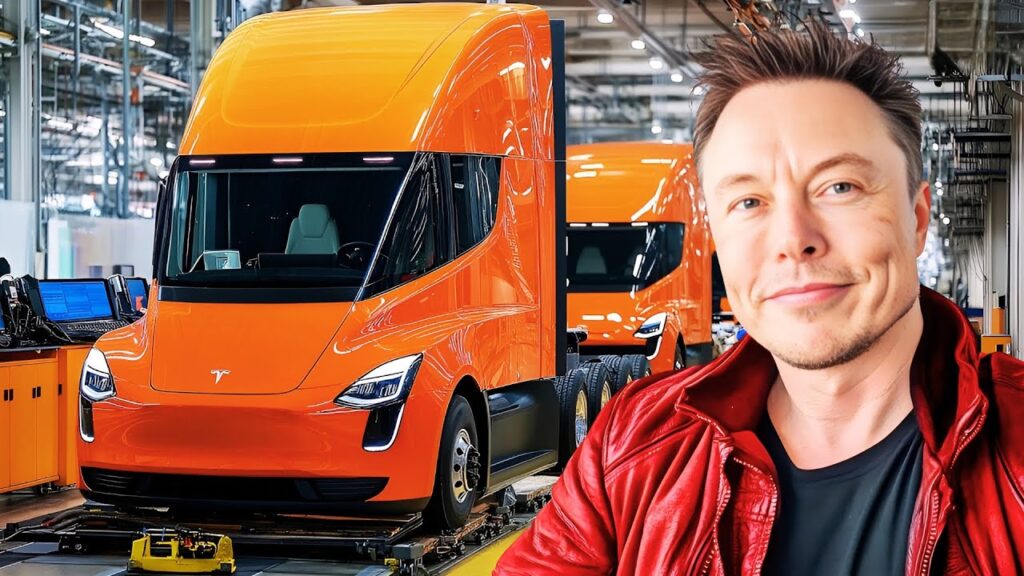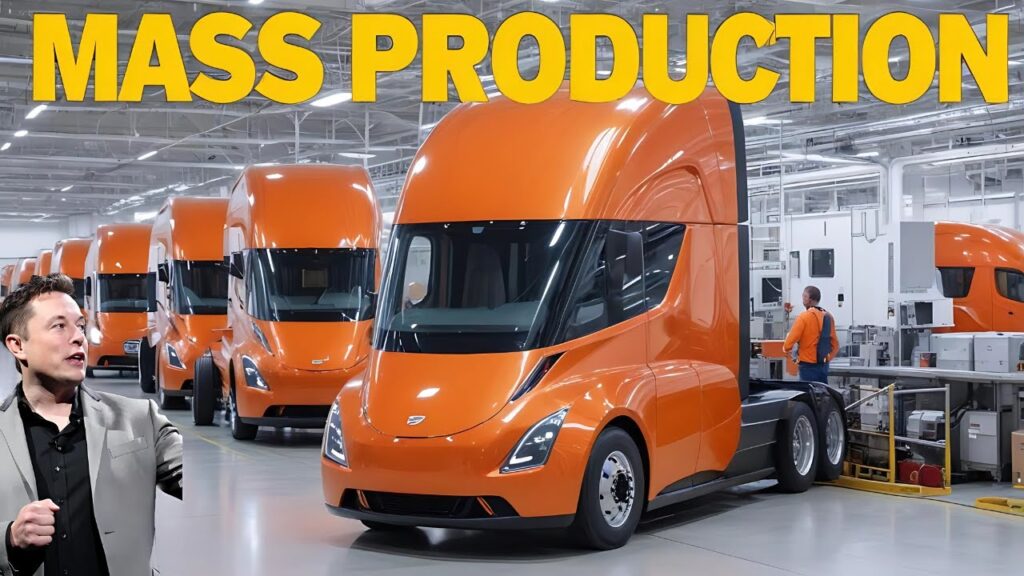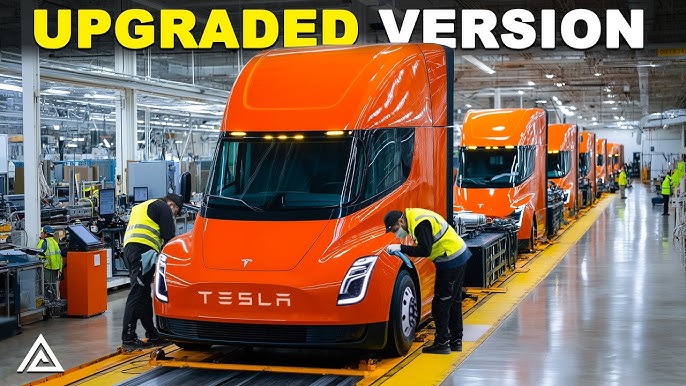
Tesla’s ambitious foray into the world of heavy-duty trucking is picking up speed, with Elon Musk making waves yet again by revealing significant updates to the Tesla Semi. This groundbreaking Class 8 electric truck, designed to deliver unmatched efficiency and performance, is now on track for mass production by December. Musk has promised that the Tesla Semi will be the “best Class 8 truck on the planet,” and with new efficiency enhancements and production ramping up, it appears Tesla is well on its way to achieving this goal.

From Slow Start to Full Production Throttle
The Tesla Semi’s journey hasn’t been without its challenges. Earlier this year, only 140 units were produced, a modest start that left some investors and industry insiders skeptical. However, Musk and the Tesla team have persevered, tackling production obstacles to accelerate output. Now, with improved production capabilities, Tesla is set to deliver over 1,000 units by the end of the year, marking a significant milestone in the company’s push to revolutionize the trucking industry.
Unmatched Efficiency: What Makes the Tesla Semi Stand Out?
One of the key selling points of the Tesla Semi is its efficiency. Designed to operate entirely on electric power, the Semi promises a range of up to 500 miles on a single charge, a remarkable achievement for a Class 8 truck. Musk has highlighted that recent upgrades to the truck’s battery technology and drivetrain have resulted in substantial efficiency gains, making the Tesla Semi a game-changer for fleet operators aiming to reduce fuel costs and emissions.

With advanced regenerative braking and low rolling resistance tires, the Tesla Semi is expected to consume less energy per mile compared to traditional diesel trucks. This will not only help reduce operational costs but also lower the environmental impact of long-haul transportation. Tesla’s Supercharger network is also expanding to support the Semi, allowing for rapid recharging that minimizes downtime and maximizes efficiency on the road.
Setting New Standards in Performance
The Tesla Semi isn’t just about efficiency; it’s also built for performance. Musk has emphasized that the Semi can accelerate from 0 to 60 mph in just 20 seconds, even with a full load, a feat that traditional diesel trucks can’t match. This level of performance, combined with Tesla’s trademark Autopilot features, offers a safer and more reliable driving experience for operators. Tesla’s enhanced driver-assist technology is expected to improve road safety by reducing accidents caused by driver fatigue, a common issue in long-haul trucking.

Moreover, the Semi’s design minimizes drag and optimizes aerodynamics, further improving range and efficiency. The spacious interior, designed for comfort and visibility, provides a more ergonomic environment for drivers, which is essential for long-distance hauls. By focusing on both driver comfort and vehicle performance, Tesla is aiming to attract fleet operators looking for a reliable, efficient, and sustainable alternative to traditional trucks.
Tesla Semi’s Role in Decarbonizing the Trucking Industry
The Tesla Semi is part of Musk’s broader vision to decarbonize the transportation industry. Heavy-duty trucks are among the largest contributors to carbon emissions, and the adoption of electric semis has the potential to make a significant impact on reducing greenhouse gases. With global demand for cleaner logistics solutions on the rise, the Tesla Semi is well-positioned to lead the charge toward a greener trucking industry.
Tesla’s commitment to sustainability goes beyond just building electric trucks. The company has been working to source sustainable materials and reduce waste throughout its supply chain. The Tesla Semi, along with the company’s solar energy products and energy storage solutions, represents a step towards a comprehensive ecosystem of clean energy that can power both residential and commercial needs.
Scaling Up for Mass Production in December
Musk’s announcement of mass production for December marks a pivotal moment for the Tesla Semi. With a production target of over 1,000 units by the end of the year, Tesla is preparing to meet increasing demand from companies seeking sustainable logistics solutions. The production ramp-up is expected to continue well into 2024, with Tesla aiming to reach full-scale production capacity at its dedicated Semi manufacturing facility.

In preparation, Tesla has invested in advanced manufacturing technologies and automated assembly lines to ensure consistent quality and efficiency in Semi production. This is crucial, as scaling production for such a large vehicle requires specialized equipment and precision. If Tesla succeeds in reaching its production targets, the Semi could soon become a common sight on highways, transporting goods in a cleaner, quieter, and more efficient manner than ever before.
A Game-Changer for the Trucking Industry?
The Tesla Semi has the potential to transform the logistics sector, setting new standards in efficiency, performance, and sustainability. With rising fuel costs and stricter emissions regulations, fleet operators are increasingly looking for viable electric alternatives. The Semi offers an attractive solution, not only by cutting operational costs but also by positioning companies as environmentally responsible leaders in their industry.
As Tesla continues to innovate and overcome production hurdles, the Semi could become a major disruptor in the trucking world. Musk’s commitment to making the Semi the “best Class 8 truck on the planet” signals a shift toward a future where electric trucks become the norm, reducing dependence on fossil fuels and paving the way for a more sustainable transport network.
What’s Next for the Tesla Semi?
As production ramps up, all eyes will be on Tesla to see if it can meet its ambitious targets and deliver a reliable product that lives up to Musk’s bold promises. The success of the Semi could accelerate the adoption of electric vehicles in the commercial sector, inspiring further innovation and pushing other manufacturers to develop competitive electric trucks. For Tesla, the Semi represents another step in its journey to reshape the automotive industry, building on the successes of its electric cars and energy solutions.
With mass production set for December and over 1,000 units projected to be delivered by the end of the year, the Tesla Semi is poised to make an impact on the trucking industry. If Tesla can continue to deliver on its promises, the Semi could redefine what’s possible for Class 8 trucks and set a new benchmark for efficiency, performance, and sustainability.